| Listing 1 - 10 of 26 | << page >> |
Sort by
|
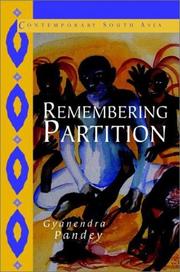
ISBN: 0521002508 0511303904 0511119887 0511613172 0511155514 0511044496 1280162279 110712459X 0511018975 9780511018978 052180759X 9780521807593 9780521002509 9780511044496 9780511155512 9780511119880 9780511613173 9781280162275 9780511303906 Year: 2001 Publisher: Cambridge New York Cambridge University Press
Abstract | Keywords | Export | Availability | Bookmark
 Loading...
Loading...Choose an application
- Reference Manager
- EndNote
- RefWorks (Direct export to RefWorks)
Through an investigation of the violence that marked the partition of British India in 1947, this book analyses questions of history and memory, the nationalisation of populations and their pasts, and the ways in which violent events are remembered (or forgotten) in order to ensure the unity of the collective subject - community or nation. Stressing the continuous entanglement of 'event' and 'interpretation', the author emphasises both the enormity of the violence of 1947 and its shifting meanings and contours. The book provides a sustained critique of the procedures of history-writing and nationalist myth-making on the question of violence, and examines how local forms of sociality are constituted and reconstituted, by the experience and representation of violent events. It concludes with a comment on the different kinds of political community that may still be imagined even in the wake of Partition and events like it.
Communalism --- Nationalism --- India --- History --- Arts and Humanities
Book
ISBN: 9814695424 9814695432 Year: 2016 Publisher: Singapore : ISEAS Yusof Ishak institute,
Abstract | Keywords | Export | Availability | Bookmark
 Loading...
Loading...Choose an application
- Reference Manager
- EndNote
- RefWorks (Direct export to RefWorks)
This book argues that Malaysia's electoral politics have historically been premised on a hybridized model of communalism and consociationalism. Beyond this it posits a newer idea of power sharing based on the dynamic and transformative practice of mediated communalism through six decades (1952_2016) of electoral politics. The strategy of mediating communalism is critically explored throughout the book, serving to test its saliency as a distinct approach to power sharing in a social formation which is ethnically, religiously and regionally divided, yet has remained remarkably and tenuously integrated throughout Malaysia's electoral history. The book delves into this question by narrating and theorizing the complexity of communal politics leading to the emergence of new politics which have attempted to put Malaysia on the track of further democratization. It is further implied that new politics has to work in tandem with mediated communalism to transcend the most deleterious effects of an ethnically divided society.
Elections --- Communalism --- Ethnic relations --- Ethnocentrism --- Malaysia --- Politics and government.
Book
ISBN: 9956762296 9789956762293 9789956762521 9956762520 Year: 2015 Publisher: Baltimore, Maryland : Baltimore, Md. : Project Muse, Project MUSE,
Abstract | Keywords | Export | Availability | Bookmark
 Loading...
Loading...Choose an application
- Reference Manager
- EndNote
- RefWorks (Direct export to RefWorks)
The idea that human beings are inextricably bound to one another is at the heart of this book about African agency, especially drawing on the African philosophy Ubuntu, with its roots in human sociality and inclusivity. Ubuntu's precepts and workings are severely tested in these times of rapid change and multiple responsibilities. Africans negotiate their social existence between urban and rural life, their continental and transcontinental distances, and all the market forces that now impinge, with relationships and loyalties placed in question. Between ideal and reality, dreams and schemes, how is Ubuntu actualized, misappropriated and endangered? The book unearths the intrigues and contradictions that go with inclusivity in Africa. Basing his argument on the ideals of trust, conviviality and support embodied in the concept of Ubuntu, Francis Nyamnjoh demonstrates how the pursuit of personal success and even self-aggrandizement challenges these ideals, thus leading to discord in social relationships. Nyamnjoh uses a popular Ivorian drama with the same title to substantiate life-world realities and more importantly to demonstrate that new forms of expression, from popular drama to fiction, thicken and enrich the ethnographic component in current anthropology.
Communalism --- Ubuntu (Philosophy) --- Africa --- Côte d'Ivoire --- Social conditions
Book
ISBN: 150363387X 9781503633872 9781503631090 9781503633865 Year: 2023 Publisher: Stanford, California
Abstract | Keywords | Export | Availability | Bookmark
 Loading...
Loading...Choose an application
- Reference Manager
- EndNote
- RefWorks (Direct export to RefWorks)
Practicing Sectarianism explores the imaginative and contradictory ways that people live sectarianism. The book's essays use the concept as an animating principle within a variety of sites across Lebanon and its diasporas and over a range of historical periods. With contributions from historians and anthropologists, this volume reveals the many ways sectarianism is used to exhibit, imagine, or contest power: What forms of affective pull does it have on people and communities? What epistemological work does it do as a concept? How does it function as a marker of social difference? Examining social interaction, each essay analyzes how people experience sectarianism, sometimes pushing back, sometimes evading it, sometimes deploying it strategically, to a variety of effects and consequences. The collection advances an understanding of sectarianism simultaneously constructed and experienced, a slippery and changeable concept with material effects. And even as the book's focus is Lebanon, its analysis fractures the association of sectarianism with the nation-state and suggests possibilities that can travel to other sites. Practicing Sectarianism, taken as a whole, argues that sectarianism can only be fully understood—and dismantled—if we first take it seriously as a practice.
Communalism --- Sects --- Religious aspects. --- Political aspects --- Social aspects
Book
ISBN: 9353281164 9789353281151 9353281156 9789353281168 Year: 2018 Publisher: [Place of publication not identified]
Abstract | Keywords | Export | Availability | Bookmark
 Loading...
Loading...Choose an application
- Reference Manager
- EndNote
- RefWorks (Direct export to RefWorks)
Nationalism and education. --- Communalism in textbooks. --- Textbooks --- Education and nationalism --- Nationalism in education --- Education
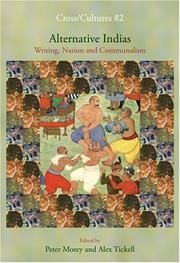
ISBN: 9042019271 9401202591 1423789040 9781423789048 9789401202596 9789042019270 Year: 2005 Publisher: Amsterdam New York Rodopi
Abstract | Keywords | Export | Availability | Bookmark
 Loading...
Loading...Choose an application
- Reference Manager
- EndNote
- RefWorks (Direct export to RefWorks)
The debate over whether religious or secular identities provide the most viable model for a wider national identity has been a continuous feature of Indian politics from the late nineteenth century to the present day. Moreover, in the last thirty years the increasingly communal articulation of popular politics and the gradual rise of a constellation of Hindu nationalist parties headed by the BJP has increased the urgency of this debate. While Indian writing in English has fostered a long tradition of political dissent, and has repeatedly questioned ethnocentric, culturally exclusive forms of political identification, few critics have considered how this literature engages directly with communalism, or charted the literary-political response to key events such as the Babri Masjid / Ramjanmabhumi affair and the recent growth of popular forms of Hindu nationalism. The essays collected in Alternative Indias break new ground in studies of Indian literature and film by discussing how key authors offer contending, 'alternative' visions of India and how poetry, fiction and film can revise both the communal and secular versions of national belonging that define current debates about 'Indianness'. Including contributions from international scholars distinguished in the field of South Asian literary studies, and featuring an informative introduction charting the parallel developments of writing, the nation and communal consciousness, Alternative Indias offers a fresh perspective on the connections and discontinuities between culture and politics in the world's biggest democracy.
Book
ISBN: 1978805446 Year: 2020 Publisher: New Brunswick, New Jersey : Rutgers University Press,
Abstract | Keywords | Export | Availability | Bookmark
 Loading...
Loading...Choose an application
- Reference Manager
- EndNote
- RefWorks (Direct export to RefWorks)
From a grandmother’s inter-generational care to the strategic and slow consensus work of elected tribal leaders, Indigenous community builders perform the daily work of culture and communalism. Indigenous Communalism conveys age-old lessons about culture, communalism, and the universal tension between the individual and the collective. It is also a critical ethnography challenging the moral and cultural assumptions of a hyper-individualist, twenty-first century global society. Told in vibrant detail, the narrative of the book conveys the importance of communalism as a value system present in all human groups and one at the center of Indigenous survival. Carolyn Smith-Morris draws on her work among the Akimel O'odham and the Wiradjuri to show how communal work and culture help these communities form distinctive Indigenous bonds. The results are not only a rich study of Indigenous relational lifeways, but a serious inquiry to the continuing acculturative atmosphere that Indigenous communities struggle to resist. Recognizing both positive and negative sides to the issue, she asks whether there is a global Indigenous communalism. And if so, what lessons does it teach about healthy communities, the universal human need for belonging, and the potential for the collective to do good?
Pima Indians --- Belonging (Social psychology) --- Communities. --- Social life and customs. --- Indigenous communalism, communalism, indigenous communities, belonging, healthy communities, Native communities, post-colonial communalism, contemporary global society, the Akimel O'odham, the Wiradjuri, culture, indigenous community builders, the collective, the individual, morality, hyper-individualist, twenty-first century, anthropology, Naïve American studies, indigenous studies, human rights, international studies, philosophy, individual rights, collective rights, communal, community, Native American, Native Indian, individualism, Indigenous rights.
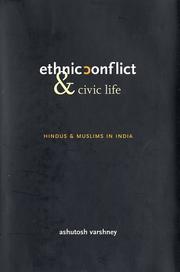
ISBN: 1281729841 9786611729844 0300127944 9780300127942 9781281729842 9780300085303 0300085303 Year: 2002 Publisher: New Haven
Abstract | Keywords | Export | Availability | Bookmark
 Loading...
Loading...Choose an application
- Reference Manager
- EndNote
- RefWorks (Direct export to RefWorks)
What kinds of civic ties between different ethnic communities can contain, or even prevent, ethnic violence? This book draws on new research on Hindu-Muslim conflict in India to address this important question. Ashutosh Varshney examines three pairs of Indian cities-one city in each pair with a history of communal violence, the other with a history of relative communal harmony-to discern why violence between Hindus and Muslims occurs in some situations but not others. His findings will be of strong interest to scholars, politicians, and policymakers of South Asia, but the implications of his study have theoretical and practical relevance for a broad range of multiethnic societies in other areas of the world as well. The book focuses on the networks of civic engagement that bring Hindu and Muslim urban communities together. Strong associational forms of civic engagement, such as integrated business organizations, trade unions, political parties, and professional associations, are able to control outbreaks of ethnic violence, Varshney shows. Vigorous and communally integrated associational life can serve as an agent of peace by restraining those, including powerful politicians, who would polarize Hindus and Muslims along communal lines.
Communalism --- Ethnic conflict --- Hindus --- Muslims --- Muslims in India --- Conflict, Ethnic --- Ethnic violence --- Inter-ethnic conflict --- Interethnic conflict --- Ethnic relations --- Social conflict --- India --- Politics and government
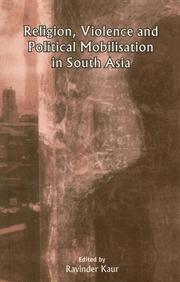
ISBN: 1282153994 9786612153990 8132102703 9788132102700 9781282153998 0761934308 9780761934301 0761934316 9780761934318 8178295776 9788178295770 8178295784 9788178295787 6612153997 Year: 2005 Publisher: New Delhi Thousand Oaks, Calif. Sage Publications
Abstract | Keywords | Export | Availability | Bookmark
 Loading...
Loading...Choose an application
- Reference Manager
- EndNote
- RefWorks (Direct export to RefWorks)
An oft-neglected theme in studies on communal violence is the role of the state, particularly of its institutions of law enforcement and policing. Recent experience with religion-based violence in South Asia-particularly, the 2002 riots in Gujarat-has brought into sharp focus this relationship between communal violence and partisan state institutions. The seven essays in this anthology-written by eminent authors from diverse traditions of anthropology, history, politics and sociology-critically re-examine the symbolism, scale and nature of communal violence in South Asia in view of the state's
Communalism --- Violence --- Religion and state --- Terrorism --- State and religion --- State, The --- Violence (in religion, folklore, etc.) --- Ethnic relations --- Ethnocentrism --- Religious aspects. --- Religious aspects --- Moral and religious aspects
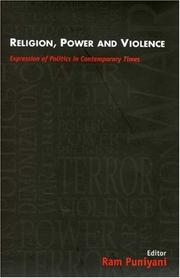
ISBN: 9352800664 8132111710 1282075144 9786612075148 8132102061 9788132102069 0761933387 9780761933380 9788132111719 0761933387 8178294745 9780761933380 9788178294742 9789352800667 9781282075146 6612075147 Year: 2005 Publisher: New Delhi Thousand Oaks Sage
Abstract | Keywords | Export | Availability | Bookmark
 Loading...
Loading...Choose an application
- Reference Manager
- EndNote
- RefWorks (Direct export to RefWorks)
Examining various aspects of socio-religious and political problems that have been sparked by the terrorist attacks of September 11 2001, this text looks at how liberalisation, globalisation and privatisation go hand-in-hand with the rise of religion-based politics.
Communalism. --- Political violence. --- Religion and politics. --- World politics. --- South Asia --- Religion - General --- Regions & Countries - Asia & the Middle East --- Religion --- Philosophy & Religion --- History & Archaeology --- India --- Politics and government --- Religion and politics --- Communalism --- World politics --- Violence --- Political crimes and offenses --- Terrorism --- Political science --- Politics, Practical --- Politics and religion --- Religions --- Religious aspects --- Political aspects
| Listing 1 - 10 of 26 | << page >> |
Sort by
|

 Search
Search Feedback
Feedback About UniCat
About UniCat  Help
Help News
News